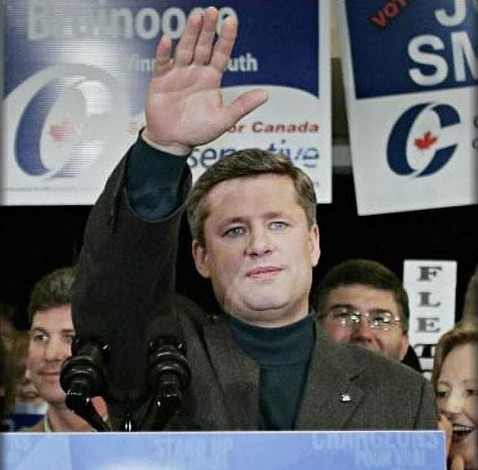
Conservatives and their allies are busy keeping Brigette DePape in the news, in a variant of the Streisand Effect. The crescendo of tsk-tsking on the Right would have done Hester Prynne’s tormentors proud.
Today a snotty grad student (believe me, I know the type, having been one myself) has a go at her. But for all his priggish finger-wagging, he manages to raise a couple of interesting questions.
DePape led a demonstration outside the Ottawa location of the Conservative Convention. She raised the usual issues of the Harper agenda and threats to democracy, without, it must be said, saying anything very new. But in her defence, there’s really not much more on this subject that can be said.
When Harper ruled with a minority, he eroded democracy in Canada to the point of being repeatedly found in contempt of Parliament. Now he has a majority, and his supporters are singing lullabies and urging us to sleep tight.
Our grad student expresses feigned shock:
The way the protesters spoke, it’s almost as if the Harper government is planning to shred the Charter of Rights and Freedoms.
No, really? You mean like marooning Abousfian Abdelrazik in Sudan until a federal court angrily ordered him returned to Canada—where he is still not legally permitted to get a job? Or refusing to act to repatriate former child soldier Omar Khadr?
Surely that sort of thing won’t occur now that Harper has his coveted majority.
With a majority, the “Stop Harper” movement believes that the Conservatives will now operate unchecked and, by doing so, fundamentally change Canada.
Silly rabbits. Where did they get that from?
But here’s the interesting part:
This fear of the unknown has led some in the movement to refer the majority as a dictatorship. But dictators don’t have a future election to try and win – even if it is four years away. Dictators don’t require the constant support of geographically and culturally diverse caucus. Dictators don’t have an upper chamber which, despite its debatable legitimacy, has demonstrated a willingness to overturn legislation. Dictators don’t have a free media to scrutinize their actions. Dictators don’t have four other parties in the legislature to openly question their policies.
OK, what do we have in Stephen Harper, then? Must we accept this binary? Or can we examine the fragile set of structures we call democracy, and assess what I would call the on-going threats?
I’ve noted before that the Prime Minister of Canada has powers that must make President Obama envious. He gets to appoint Senators and judges and his Cabinet, sign treaties, send Parliament packing at will, and stack countless boards and commissions. The increasing concentration of power in the PMO is by now common knowledge. And we lack any serious system of checks and balances. There may be four other parties in the House of Commons, but they don’t have the votes to put a stop to a single thing the PM desires.
What Harper says, goes. Why would he hold back now?
Dictators have elections all the time. And they survive by courting enough interests (while playing them off against each other) to remain unthreatened.
The Upper Chamber has only overturned opposition legislation, after it had been passed by our elected representatives in the House of Commons. And, just to remind our history student, it has been stuffed with Harper cronies to the point of bursting (and that’s not another Mike Duffy slur). To imagine that the Senate is a check upon Harper and his agenda is utter fantasy.
Our “free media” almost unanimously endorsed Harper in the past election. They are free, certainly, but only for those who own one, as the saying goes, and our media are for the most part the voice of corporations. Although tamed and chastened, the CBC is still in the sights of the Right, and may not survive the next four years.
None of which is to say that Harper is Mugabe, or Stalin, or even Hitler, but all of which is to say that we shouldn’t be smugly complacent about our democratic freedoms, such as they are. If “silly rhetoric” is on offer from some quarters, so what? At least these young people are awake. And if there was ever a time to stay wakeful, that time is surely now.
